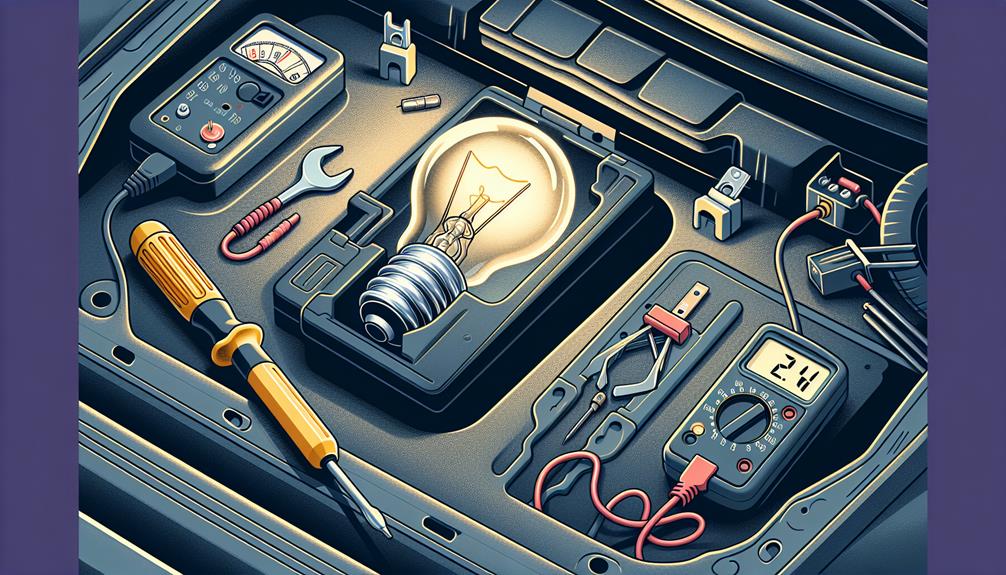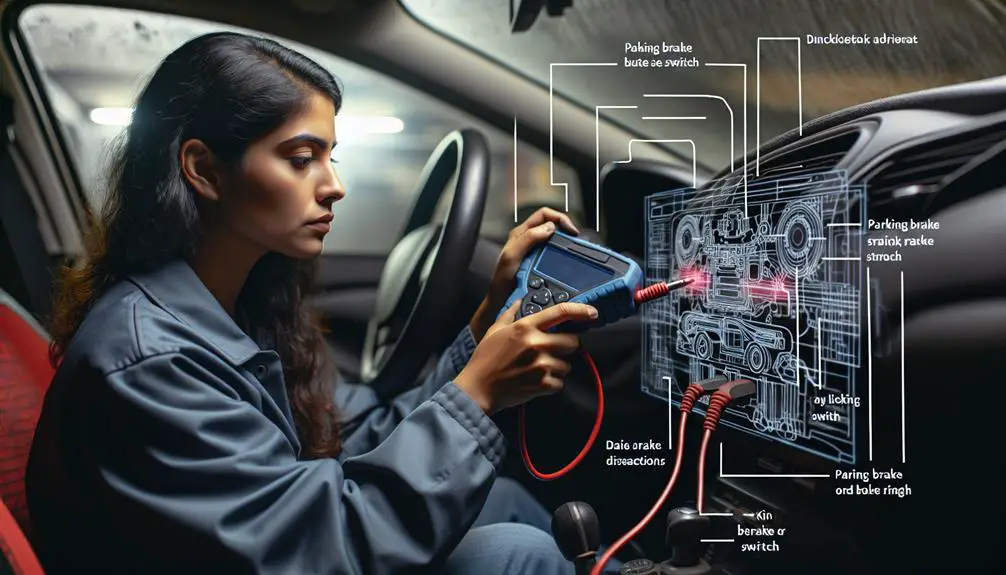This issue may also be caused by a faulty parking brake switch or a problem with the dashboard indicator. It is important to address this problem promptly to ensure the safety and functionality of your vehicle.
In some cases, the parking brake light may not turn on if the parking brake is not fully engaged or if the brake fluid is low. It is recommended to check these components before seeking professional assistance.
Understanding the Parking Brake System

Before delving into the specifics of parking brake light issues, it's important to grasp how the parking brake system functions in your vehicle. This system, often referred to as the emergency brake, plays a significant role in your car's safety mechanisms, ensuring that your vehicle remains stationary when parked, especially on an incline.
At its core, the parking brake system is mechanical, relying on a series of cables that, when engaged, apply pressure to your vehicle's rear brakes. You activate this system either by pulling up a lever, pressing a pedal, or, in more modern vehicles, pushing a button. Regardless of the method, the action tightens the cable, clamps the brake pads onto the rear wheels, and prevents the car from moving.
Now, the parking brake light on your dashboard is directly tied to this system. It's designed to alert you when the parking brake is engaged, acting as a safety reminder to disengage it before driving off. However, it's not merely an indicator for the parking brake's status; it can also serve as a warning signal for the overall health of your braking system.
Understanding this dual role is key. The light ensures you're aware that the mechanical action has been successfully initiated or, conversely, signals when it's safely disengaged. But remember, it's just one component of a complex system designed to keep you safe. Paying attention to it and understanding its function within the broader context of your vehicle's safety features is important for maintaining your car's longevity and your safety on the road.
Common Causes for Malfunction
Now that you grasp how the parking brake system works, let's investigate what causes its indicator light to malfunction. Several factors can lead to this issue, and it's crucial you're aware of them to diagnose the problem accurately.
Initially, a malfunctioning parking brake switch is a common culprit. This switch is what signals your car's computer or dashboard that the parking brake has been engaged. If it's faulty or damaged, it won't trigger the light, regardless if the brake is properly set.
Wear and tear on the parking brake system itself can also lead to issues. Over time, cables can stretch or break, and mechanisms can seize because of lack of use or maintenance. This deterioration can prevent the system from fully engaging, which, in turn, means the light won't turn on as it should.
Electrical issues beyond the bulb and fuse, like wiring problems, can cause the light to malfunction. Damaged wires or poor connections can interrupt the signal between the parking brake system and the light on your dashboard.
Lastly, problems with your car's instrument cluster, where the parking brake light is located, can affect its functionality. This could be because of internal faults within the cluster itself, affecting not just the parking brake light but potentially other warning lights and gauges.
Grasping these common causes gives you a solid starting point for troubleshooting the issue. Remember, diagnosing car problems can sometimes be complex, so don't hesitate to consult a professional if you're unsure.
Checking the Bulb and Fuse

Often, the most important step in troubleshooting a malfunctioning parking brake light is to check the bulb and fuse. These elements are essential for the light to function properly, and their failure is a common culprit for issues.
To begin with, inspect the bulb. Over time, bulbs can burn out or become damaged. If the bulb looks dark or the filament inside is broken, it's time for a replacement. Next, you'll want to check the fuse dedicated to the parking brake light circuit. A blown fuse is often a sign of electrical issues but is straightforward to replace. You'll find the fuse box diagram in your vehicle's manual, showing you exactly which fuse to examine.
When checking these components, remember:
- *You're not just fixing a light; you're ensuring your safety and that of others on the road.*
- *A working parking brake light is your silent guardian, alerting you and others when your vehicle is securely parked or if there's a potential issue.*
- *This simple check could save you from costly repairs down the line.*
- *Feeling the satisfaction of diagnosing and fixing the issue yourself is priceless.*
- *Taking this step restores not just the function but also your peace of mind while driving.*
Why Is My Parking Brake Light Not Turning on? Is It Related to the High Mounted Brake Light?
If your parking brake light is not turning on, it may be unrelated to the high mounted brake light function. The parking brake light is generally tied to the hydraulic system, while the high mounted brake light is typically connected to the vehicle’s electrical system. It’s best to have a professional diagnose the issue.
Electrical Wiring Issues
After checking the bulb and fuse, it's time to examine the electrical wiring for any issues that could be affecting your parking brake light. The wiring system of your vehicle is like the nervous system of the human body; it needs to be in perfect condition to make sure signals are correctly sent and received. Problems with the wiring can often lead to the parking brake light not turning on, and identifying these issues can be a bit tricky without the right knowledge.
Here's a quick guide to help you understand common electrical wiring issues:
| Problem | Symptom |
|---|---|
| Loose Connections | Intermittent light functionality |
| Corroded Wires | No light; erratic light behavior |
| Broken Wires | Consistently non-functioning light |
Loose connections are often the culprit behind erratic light behavior. These can usually be found at either end of the wiring harness connected to the parking brake system. A simple check can reveal if any wires have come loose and resecuring them might solve your issue.
Corrosion is another enemy of electrical systems. Over time, moisture and road salt can lead to corroded wires, especially in older vehicles. This corrosion can interrupt the electrical signal, preventing the parking brake light from turning on. Inspecting the wires for any signs of green or white corrosion can give you a clue about the state of your wiring.
Broken wires are a definitive reason for the parking brake light not functioning. Wires can break because of wear and tear, or during maintenance work. A thorough inspection might reveal breaks in the wiring that require soldering or complete replacement.
Professional Diagnostic Steps

If you've tackled the simpler fixes without success, it's time to contemplate professional diagnostic steps to pinpoint the issue with your parking brake light. Heading to a professional mechanic or automotive electrician can provide the expertise and diagnostic tools necessary to explore deep into the problem, guaranteeing your vehicle remains safe and compliant with road safety regulations.
When you approach a professional, they'll likely undertake a series of diagnostic steps. These might include:
- Checking the parking brake system for any mechanical failures that could be affecting the light.
- Inspecting the electrical wiring and connections for signs of damage or wear.
- Testing the parking brake switch to make sure it's functioning correctly.
- Using specialized diagnostic tools to scan for any error codes that could indicate the root cause of the issue.
- Assessing the vehicle's onboard computer system, which can often provide insights into electrical and sensor-related problems.
These steps are designed to offer a thorough overview of the potential issues, leading to a precise diagnosis. The benefits of professional diagnostics are clear:
- Peace of Mind: Knowing that your car's safety features are functioning correctly.
- Accuracy: Pinpointing the exact issue saves time and money on unnecessary repairs.
- Safety: Ensuring the parking brake light works correctly, reducing the risk of accidents.
- Compliance: Keeping your vehicle in line with road safety regulations.
- Longevity: Addressing the problem promptly can prevent further damage to your car's systems.
Taking your car to a professional might seem like a hassle, but it's a critical step in maintaining its safety and reliability. Don't let a faulty parking brake light compromise your peace of mind on the road.
Conclusion
In wrapping up, you've got a clear roadmap to tackle a parking brake light that won't illuminate. From comprehending your car's system to examining common hiccups like bulb or fuse issues, and unraveling potential electrical wiring problems, you're well-prepped.
If those steps don't clear things up, it's wise to turn to a pro for a thorough diagnostic. Remember, addressing this early can save you from future headaches and keep your ride safe and compliant.